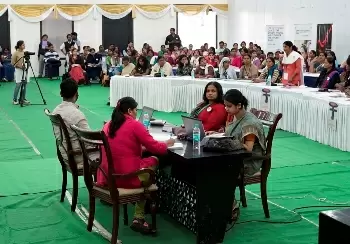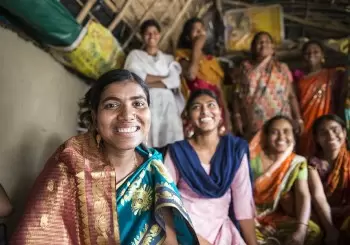“I am committed to giving women a voice and unleashing their inner potential”
22-December-2014
Vol 5 | Issue 51
Monemma is a sprightly, outspoken young woman, who belongs to the Yanadi tribal community of Andhra Pradesh. There was impatience in her voice as she gave an update on the projects and campaigns she is leading on promoting the rights of girls and women in her native town of Nellore.
Having spent her childhood as a bonded labourer, who was rescued only a few years back by a local human rights organisation, she is a woman in a hurry.
 |
|
Eighty grassroots women activists from across India brought to life a Women’s Parliament in Delhi (Photos: Taru Bahl\WFS)
|
According to her, “Too much time has been lost already. Women themselves are oblivious of their value and are mock spectators to the unfolding of their destinies. Even though I lost the Andhra Assembly election in 2009, by a narrow margin of 6,000 votes, I am committed to giving women a voice and unleashing their inner potential.”
She informed that, like her, nearly 25,000 families belonging to the Yanadi tribal community living in Nellore district are still under bondage situations. More than 12,000 acres of land belonging to them is in the hands of mighty local ‘zamindaars’ (land owners).
There is absolutely no one to pick up the cudgels on behalf of these women and restore to them what is rightfully theirs. They continue to live a life of abject poverty, humiliation, exploitation and helplessness. As she spoke about her people and their problems, urging Revenue and Labour officials to immediately visit the location, take stock of the situation and initiate necessary steps of rescue and rehabilitation, there was a lot of passion, conviction and hope in her voice.
Monemma was one of 80 grassroots women activists from across India who brought to life a mock Women’s Parliament organised by ActionAid as part of its Beti Zindabad campaign.
The campaign, which was launched in 2012, has worked with a clutch of women’s organisations from 64 districts in 20 states, resolving to give women’s empowerment a more physical and active voice, especially in a way that can make a strong political comment.
While the initial trigger for the campaign was the declining child sex ratio in the country, it has since evolved into a larger movement that looks at a range of issues faced by women and girls at various stages of the life cycle, taking into account their geographical and social contexts.
Trafficking and child marriage in West Bengal, acid attacks and domestic violence in Bihar, female infanticide in Haryana, rising sex violence in Maharashtra and skewed land distribution in Karnataka are some of the chronic conditions that women have been living with for generations. Campaigns and enactment of laws has brought about some awareness but change is yet to be seen.
The Women’s Parliament, the first of its kind in India, was one way of articulating these challenges. It was organised in Delhi, the seat of the country’s polity, to compel “real Parliamentarians” to sit up and take notice.
While ‘morchas’ (rallies) and ‘bandhs’ (boycotts) have their own place in the turbulent landscape of social, cultural and political change, the mock Parliament, which turned out to be a resounding success, unleashed years of pent-up angst, as women activists-members used data, evidence, recent cases and their powerful oratory skills to present to the House a range of issues that impact them.
Remarked an activist from Nagaland, “It is not as if the powers that be are not aware of what is going on. It is just not a priority. Women’s issues and their voices are, therefore, viewed as noisy clamouring, not urgent items on the national agenda that need redress and action.”
The unique Parliament presented an alternative vision of political participation where women’s voices are heard and given their due importance. This assumes relevance given the fact that women today account for just 11 per cent of the 543 members in the all-important Lok Sabha (Lower House).
The proceedings were structured to mirror the actual Parliament, which incidentally is in session, complete with a government, opposition and Speaker.
Noted feminist- activist Kamla Bhasin, who presided as the Speaker, said, “A range of issues were raised in this Parliament. From problems of brick kiln workers to cases of ostracising and branding women as witches – all of which is happening even seven decades after Independence. I am glad that this parliament has the consciousness to table some of these issues and provide an example of how a people’s parliament should be.”
 |
|
The Women’s Parliament was organised to compel “real Parliamentarians” to sit up and take notice of women’s issues and their voices
|
The Question Hour proved to be an important part of the proceedings, as several issues such as Dalit women’s access to land, equal property rights of women, women’s political participation, social security, disability issues, declining child sex ratio, transgender issues, gender-based discrimination, health and sanitation issues, wage inequality, workplace harassment, issues of minorities and tribal women and more, were raised through a total of 23 questions tabled.
Babita from Nalanda in Bihar drew attention to how in spite of land distribution taking place seven times in as many years, not one Dalit woman had so far benefitted from the Act.
A team of parliamentarians comprising D. Raja, Ali Anwar, N. Swamy and others was present at the mock Parliament in a show of support and encouragement.
What the Women’s Parliament essentially has done is to draw up a very articulate wish list through the 27 questions that raise issues that women face across the country. Over debate and discussion (read crossfire, in Parliamentary language), it has even come up with some plausible solutions.
For instance, having Protection Officers for domestic violence cases in every state and demanding that this be an independent post and not a joint one. That the mock Women’s Parliament members meant business was clear to everyone.
As Dr Syeda Hameed, former member of the Planning Commission, remarked, “These women are not going to be easily placated and satisfied. We in the government have to become more responsive. I am going to push for some of the issues raised at this platform to be tabled in the Parliament’s ongoing Winter Session.”
The mock Parliament might have concluded but each of the women activists has gone back with a little more hope and a lot more promise. - Women's Feature Service














